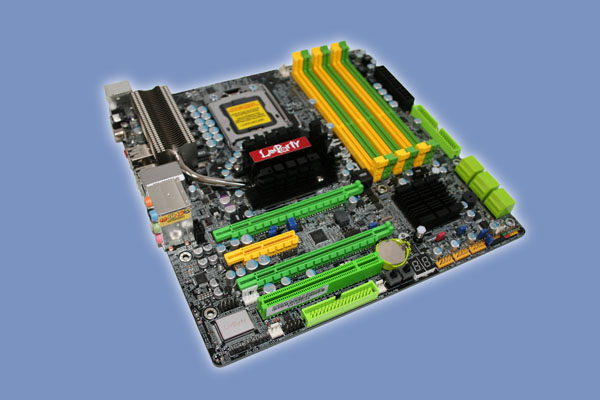DFI X58 T3H6 JR mATX Motherboard
Conclusion
Â
The DFI T3H6 Jr mATX motherboard is clearly a great performer. Although mATX motherboards of old were targetted towards those looking to build a media PC, this motherboard would be wasted in such a setup. The T3H6 has it’s eyes firmly set on those looking for performance in a small package and the DFI has certainly has performance by the bucket load.
Â
Capable of keeping pace and at times bettering it’s full size brethren, the baby DFI motherboard punches well above it’s weight. It’s packaged very well however, the accessories could be better and the colour scheme is wearing a little thin. I was disappointed in the way DFI secured the nuts to the screws using a waxy glue affair which was over the top and makes removal a pain. Despite this, a 4.2GHz overclock was obtained and that’s a shining example of just how capable this motherboard really is.
Â
IÂ get the feeling IÂ have only scratched the surface of its capabilities though having only had the motherboard for two weeks which believe me is not enough time to fully try out every setting in the BIOS which, as per usual DFIÂ standards, is second to none. The Vdroop phenomena was simply not there when placing the mothebroard under load but perhaps more worrysome, the CPU voltage actually increased which is totally against Intels specification to aid with the possible voltage spikes encountered which could destroy your CPU! DFI it seems do not agree with this line of thinking.
Â
Performance wise, the DFI T3H6 Jr falls short of beating the Asus Gene, it’s most direct competitor and with both motherboards priced roughly the same, the decision on which is the better board is not one IÂ would like to call. There is little doubting both motherboards can easily overclock your CPU to the max and both motherboards are attractive in their own unique way. The DFI board offers a better, more refined and extensive BIOS overall, whereas the Asus motherboard offeres better connectivity. Both motherboards are the perfect solution for LAN gamer hoping to slug it out with the best and both motherboards offer the end user almost everything a full size ATX board does bar the obvious ommisions due to its decrease in size.
Â
If the DFI offers all the connectivity you need and if you don’t crave the excessive frills the Asus Gene offers then I would go with it, simply because the motherboard feels more streamlined and aimed more directly at overclockers. However, the Asus motherboard offers a more bang per buck which may sway your decision in it’s favour. Regardless, whichever board you choose, both will no doubt serve you well.
Â
Â
The Good
– Excellent performance
– BIOS options second to none.
– SLI/Crossfire compatability
– Excellent performance
– BIOS options second to none.
– SLI/Crossfire compatability
Â
The Mediocre
– Accessories could be better
– Limited connectivity
– Accessories could be better
– Limited connectivity
Â
The Bad
– Screw glue is not the best idea in the world
– Screw glue is not the best idea in the world
Â
Â




